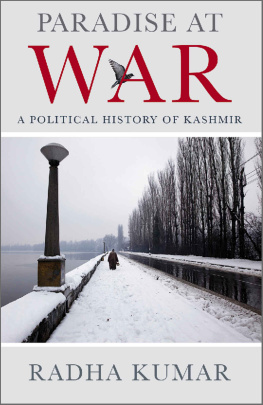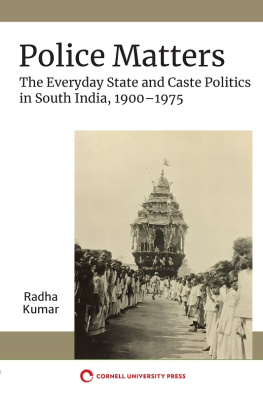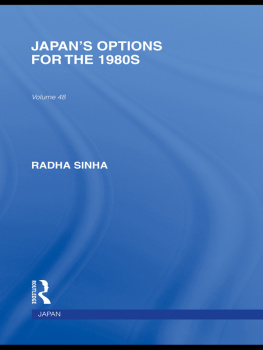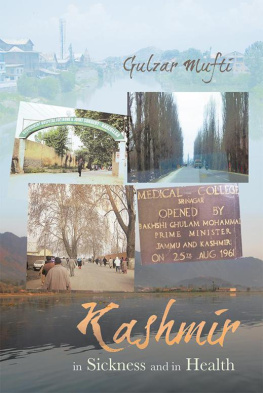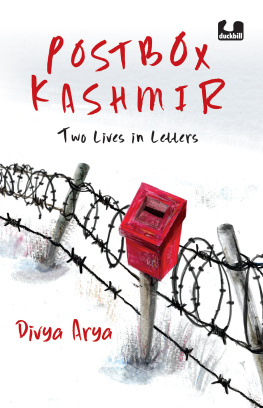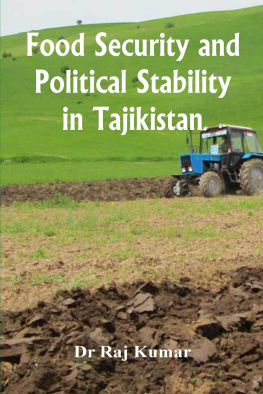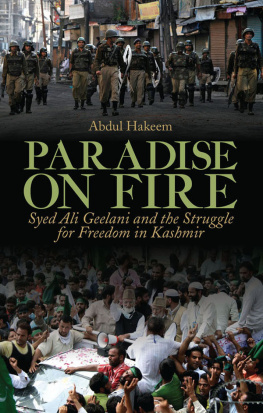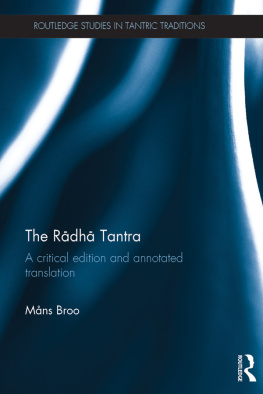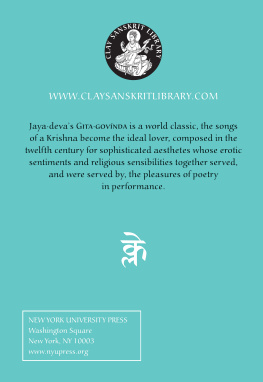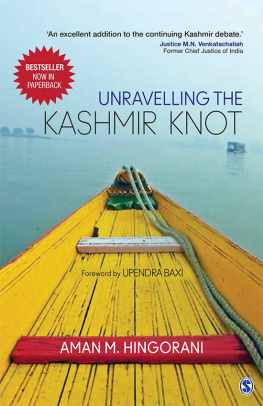Radha Kumar - Paradise at War: A Political History of Kashmir
Here you can read online Radha Kumar - Paradise at War: A Political History of Kashmir full text of the book (entire story) in english for free. Download pdf and epub, get meaning, cover and reviews about this ebook. year: 2018, publisher: Aleph Book Company, genre: Politics. Description of the work, (preface) as well as reviews are available. Best literature library LitArk.com created for fans of good reading and offers a wide selection of genres:
Romance novel
Science fiction
Adventure
Detective
Science
History
Home and family
Prose
Art
Politics
Computer
Non-fiction
Religion
Business
Children
Humor
Choose a favorite category and find really read worthwhile books. Enjoy immersion in the world of imagination, feel the emotions of the characters or learn something new for yourself, make an fascinating discovery.
- Book:Paradise at War: A Political History of Kashmir
- Author:
- Publisher:Aleph Book Company
- Genre:
- Year:2018
- Rating:4 / 5
- Favourites:Add to favourites
- Your mark:
- 80
- 1
- 2
- 3
- 4
- 5
Paradise at War: A Political History of Kashmir: summary, description and annotation
We offer to read an annotation, description, summary or preface (depends on what the author of the book "Paradise at War: A Political History of Kashmir" wrote himself). If you haven't found the necessary information about the book — write in the comments, we will try to find it.
Radha Kumar: author's other books
Who wrote Paradise at War: A Political History of Kashmir? Find out the surname, the name of the author of the book and a list of all author's works by series.
Paradise at War: A Political History of Kashmir — read online for free the complete book (whole text) full work
Below is the text of the book, divided by pages. System saving the place of the last page read, allows you to conveniently read the book "Paradise at War: A Political History of Kashmir" online for free, without having to search again every time where you left off. Put a bookmark, and you can go to the page where you finished reading at any time.
Font size:
Interval:
Bookmark:
PARADISE AT
WAR
Books by Radha Kumar
A Gender Atlas of India
Making Peace with Partition
Divide and Fall?: Bosnia in the Annals of Partition
The History of Doing: Movements for Womens Rights and Feminism in India, 18001990
Books edited by Radha Kumar
Negotiating Peace in Deeply Divided Societies: A Set of Simulations
Bosnia-Herzegovina: Between War and Peace (Josep Palau)


ALEPH BOOK COMPANY
An independent publishing firm
promoted by Rupa Publications India
First published in India in 2018 by
Aleph Book Company
7/16 Ansari Road, Daryaganj
New Delhi 110 002
Copyright Radha Kumar 2018
All rights reserved.
The author has asserted her moral rights.
The views and opinions expressed in this book are the authors own and the facts are as reported by her, which have been verified to the extent possible, and the publishers are in no way liable for the same.
No part of this publication may be reproduced, transmitted, or stored in a retrieval system, in any form or by any means, without permission in writing from Aleph Book Company.
ISBN: 978-93-88292-12-2
1 3 5 7 9 10 8 6 4 2
This book is sold subject to the condition that it shall not, by way of trade or otherwise, be lent, resold, hired out, or otherwise circulated without the publishers prior consent in any form of binding or cover other than that in which it is published.
Kashmir, the Lyric
O best of kings, the goddess Uma is also Kasmira.
An enchanting lake for six generations of our aeon,
It became a beautiful land in this generation.
O protector of men! Earths hallowed spaces are all here.
Starred with hermitages, sweet in summer and winter,
It augurs good fortune.
Impregnable,
Innocent of the fears of defeat,
Rich in cow, horse and elephant,
It is free of famine.
Graceful as a temple where gentlewomen pray,
It is free of evil serpents, tigers, buffaloes or bears.
Always celebrant,
Where the bow twangs and Vedic chants resound,
It throngs with sportive and joyous crowds.
Nilamata Purana, sixth to eighth century
The land of Kashmir is blessed like the land of Syria,
Fruit trees and shade trees, wondrous streams and soaring mountains,
Are found here.
This land was settled by the Prophet Solomon,
His genies turned it into a fertile flowering garden.
Allahs friends and followers make their home here,
This land is without equal, the place of spirits and angels.
Baba Daud Khaki, sixteenth century
CONTENTS
PREFACE
This book is a labour of pain as much as of love. I began working on the Kashmir conflict in 1990 when the valley was in the throes of an armed uprising. Hindal Tyabji, then the states Commissioner Secretary for Industries, came to our house in deep distress, asking for my fathers help. Where was Indias civil society? he asked. Why were they not in Kashmir during its time of trouble, as they had been in Delhi when the riots against Sikhs took place in 1984?
I had been one of the thousands who sprang to action in 1984, rescuing beleaguered Sikhs from the burning streets of Delhi and campaigning for the army to come out and stop the riots. The year after, when my friend R. N. Kumar asked me to go to Bhopal and help with his work with the victims of the Union Carbide disaster, I had shared the pain of another community. And then came the attempt to revive the culture of sati or widow immolation in Rajasthan and the attempt to deny Muslim women rights to alimony from their husbands in the case of an ageing widow named Shah Bano.
I was already traumatized by these horrors when Hindal came to our house. I told my father that I did not think I could invite any more trauma. But my father pushed me. Hindal was an unusually caring civil servant, he said; our country needed help. So I went to Kashmir, and was shocked by what I saw. Srinagar thronged with men shouting azaadi slogans. The army and police lined the streets. At every corner, weedy and poorly armed Indian soldiers peered nervously over makeshift barricades composed of piled-up khaki sandbags. Civil servants roared through under armed escort. There was a night curfew and a day curfew: the night curfew monitored by security forces and the day curfew monitored by Islamic guerrillas. As we passed an army checkpost, Hindals driverwho like drivers the world over was a fount of political informationsaid to me: Madam, what has happened? The army were our friends but now they are behaving like our enemies.
I still could not figure out what to do, though, as I did not have any Kashmiri friends to work with. My causes had been rooted in mainland India and not in what academics call the periphery. I knew that Kashmir was distinct from the rest of India, both culturally and constitutionally, and that it was in conflict, but that was the extent of my knowledge.
The year after, in 1992, I accepted a job in Prague with the Helsinki Citizens Assembly, a network of civil society groups in East and West Europe working for European integration from below. I wanted to get away from the violence that had marked India from the mid- to late 1980s, and Europe was in an exciting transition. The Berlin Wall had fallen and political leaders were talking about a brave new world order based on democracy and freedom. But when I arrived I found that the guns of partition had begun to boom in Yugoslavia, while Czechoslovakia had embarked upon what I thought was impossible: a peaceful division. Since the Helsinki Citizens Assembly had active national committees in both these countries, our entire network was involved in campaigning for an end to the war in Yugoslavia and for a negotiated resolution to the demand for separation in Czechoslovakia.
Remarkably, given the history of other ethnic divides, such as Northern Ireland, Bosnia or Cyprus, the Czechs and Slovaks proved me wrongtheirs was one of the very few partitions in history without internecine violence.
The Czechoslovak experience set me thinking. Like the Czech and Slovak leaders in 1992, the leaders of soon-to-be India and Pakistan had hoped to achieve partition without violence in 1947. Yet, our country suffered the same macabre ethnic violence that Bosnia did, concentrated in Punjab. Why were we like Yugoslavia rather than Czechoslovakia? The obvious answer is that the Czech and Slovak territories were largely ethnically homogenous, and so, separation did not entail a massive upheaval of people. Bosnia and India, on the other hand, were deeply intermixed, ethnically as well as religiously. A division on communal lines was therefore bound to cause huge human sacrifice, of home, friends, propertyand lives.
This recognition led me to look at other communal partitions. I found that what Bosnia, India, Northern Ireland and Cyprus had in common was that, in each case, the scars left by partition wars had metamorphosed into institutional hostility between the new and old states that lasted for decades, if not half a century and more as in our case as well as Northern Irelands. Despite their baggage, the independence leaders in Northern Ireland entered into immensely demanding peace negotiations with Britain and Ireland that resulted in the Belfast Peace Agreement of 1998. In Cyprus and Bosnia, too, multilateral efforts at political reconciliation were ongoing. Could India and Pakistan not do the same?
Next pageFont size:
Interval:
Bookmark:
Similar books «Paradise at War: A Political History of Kashmir»
Look at similar books to Paradise at War: A Political History of Kashmir. We have selected literature similar in name and meaning in the hope of providing readers with more options to find new, interesting, not yet read works.
Discussion, reviews of the book Paradise at War: A Political History of Kashmir and just readers' own opinions. Leave your comments, write what you think about the work, its meaning or the main characters. Specify what exactly you liked and what you didn't like, and why you think so.

